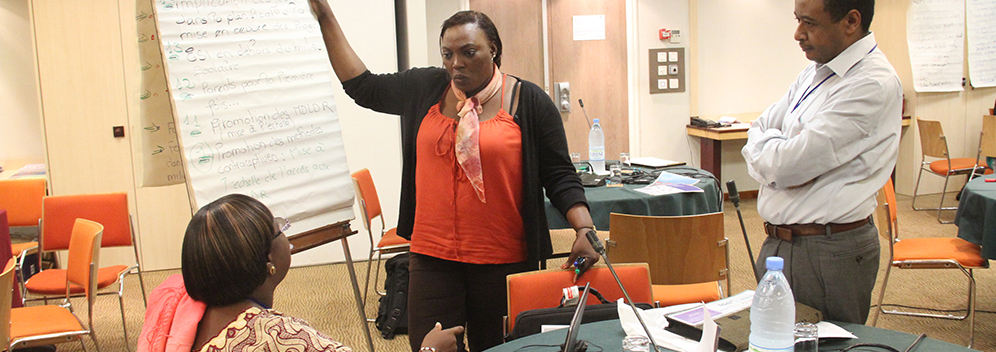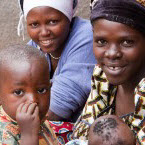
Community of Practice on Systematic Approaches to Scale-Up
STAY INFORMED
E2A, in partnership with the Implementing Best Practices Initiative and E2A's core partner ExpandNet, leads the community of practice, Systematic Approaches for Scale-up of Family Planning/Reproductive Health Best Practices, which is hosted on the Knowledge Gateway. The community of practice is led by a resource team of individuals with experience in the application of systematic approaches to scaling up.
The goal of this community of practice is to increase the use of systematic approaches for sustainably scaling up best practices in family planning/reproductive health (FP/RH). Members share their experiences and practical tools in this area through webinars, events, and online discussions. The community provides a venue for country-, regional- and global-level exchanges to facilitate learning about how best practices can benefit more people and foster policy and program development.
Community of practice members include a diverse range of global health and development actors including, but not limited to:
- regional- and country-level policymakers
- program managers and researchers from the public, private and NGO sectors
- donors and other organizations with an interest in advancing the science and practice of scaling up through the use of systematic approaches
Webinars
The community of practice leads a series of webinars on diverse topics related to systematic scale-up. Information about each webinar follows.
Webinar 1: Promising Practices for Scaling Up a Reproductive Health Innovation
This webinar, held on October 9, 2013, featured a presentation by Rebecka Lundgren of Georgetown University's Institute for Reproductive Health (IRH), which covered the systematic approach applied by IRH to scale up use of the Standard Days Method.
Webinars 2, 3, and 4 comprised a series on the topic of costing for scale-up.
Webinar 2: Rationale and Introduction to Methods for Costing the Scale-Up of Family Planning Programs
This webinar, held on January 28, 2014, featured presentations by John Bratt and Christine Lasway of FHI360. Mr. Bratt presented an introduction to estimating costs for scale-up and highlighted the importance of costing, while Ms. Lasway talked about developing Costed Implementation Plans and how costs for scale-up are featured in those plans.
Webinar 3: Models and Tools for Costing the Scale-Up of Family Planning Programs
Held on March 19, 2014, this webinar featured presentations from economist Dr. Lori A. Bollinger of Futures Institute and Ms. Zina Jarrah of Management Sciences for Health. Dr. Bollinger presented about how to use the FamPlan tool for advocacy purposes, while Ms. Jarrah described how to use the CORE Plus Tool for costing the scale-up of FP/RH services at the primary level.
Webinar 4: Financing the Scale-Up of Family Planning Programs
This webinar, held on May 23, 2014, was an interactive session where a panel of four experts on financing for scale-up responded to questions from the moderator and webinar participants. The panelists were Monica Kerrigan, Deputy Director of Family Planning at the Bill & Melinda Gates Foundation; Johannes Linn, Senior Fellow at the Brookings Institution; Allyala Nandakumar, Chief Economist for Global Health at USAID; and Frank Nyonator, Dean of the School of Public Health at the University of Health and Allied Sciences in Ghana.
Webinar 5: Synergistic Relationship of Institutionalization and Expansion: Lessons from Scale-up of Youth-Friendly Services in Five Countries
On August 20, 2014, the webinar featured a presentation led by Gwyn Hainsworth of Pathfinder International, with three discussants: Dr. Venkatraman Chandra-Mouli of the World Health Organization's Department of Reproductive Health and Research; Laura Ghiron of ExpandNet; and Regina Benevides of E2A. During the webinar, participants learned about the synergies gained when vertical and horizontal scale-up processes are undertaken simultaneously, tradeoffs between institutionalization and expansion as well as the implactions for sustainable scale-up, and considerations for expansion and institutionalization of youth-focused innovations.
Webinar 6: Shifting Mindsets to Make Change Stick: Fostering Change for Scale-up
The webinar, held on July 17, 2015, presented the body of knowledge about effective change & summarized key points about what that research suggests about effective change; showed evidence that using a systematic approach to scaling up (and monitoring scale-up) can increase chances of success; introduced the Guide to Fostering Change as a collective body of learning that provides an overarching pathway for scaling up; and highlighted key parts of the guide, with an emphasis on the principles of change and how the guide is designed to support practioners to set shared direction, champion the change and scale up efforts.
Webinar 7: From pilot to scale: Institutionalizing the Population-Health-Environment approach for sustainable development in East Africa
The webinar, held on June 22, 2016, was co-hosted with the Population Reference Bureau and focused on the Health of People and Environment (HoPE) project in the Lake Victoria Basin. During the webinar, East African staff from the HoPE project shared how the project is unique in its specific focus on designing for, and sustainably scaling up the project approach to new areas using ExpandNet guidance.
Webinar 8: Leadership Universitaire pour le Changement en SSRAJ au Niger: une expérience participative de la mise à l’échelle (University Leadership for Change in Sexual and Reproductive Health in Niger: a participatory scale-up experience)
This webinar, held on January 26, 2017 (in French), presented how E2A applied ExpandNet/WHO's systematic approaches to scale-up within its University Leadership for Change in Sexual and Reproductive Health project at Abdou Moumouni University in Niamey. This experience included an emphasis on documentation and creation of a co-management committee that included youth leaders, university administration, and the ministries of public health and higher education to increase potential for sustainability and scale-up.
Meetings with Experts and Practitioners
In addition to webinars, the community of practice has held the following in-person technical consultations and workshops.
Research Gaps in Scale Up of Family Planning and Reproductive Health Programming, June 23, 2014, Washington, DC
This meeting was held at the request of USAID’s Office of Population and Reproductive Health to help guide their research strategy. The Evidence Project, in collaboration with E2A, the Health Policy Project, and MEASURE Evaluation convened this meeting to discuss research gaps related to scale-up. Read the report here.
Systematic Scale-Up of Family Planning and Reproductive Health Best Practices, December 5, 2014, Washington, DC
The community of practice held a meeting that convened practitioners and experts on scale-up. You can read a summary of that meeting here, download supporting materials and presentations here, and view the meeting report here.
Hands on for Scaling Up Family Planning & Reproductive Health Best Practices: Experiences & Challenges from Africa, June 15, 2015, Addis Ababa, Ethiopia
The community of practice held a workshop for practitioners in East and Southern Africa. You can download supporting materials and presentations here and read the meeting report here.
Fostering Change for Scale-Up of Good Practices in the WAHO Region, July 28, 2015, Ouagadougou, Burkina Faso
The community of practice, in collaboration with several partners, joined more than 100 Ministry of Health focal points and officials and NGO partners from across West Africa to familiarize them with tools and approaches they can use to systematically scale up effective practices in maternal health, reproductive health/family planning, and adolescent/youth sexual and reproductive health. The workshop set the stage for the first Economic Community of West African States Forum on Good Practices in Health. Read the report here.

Scaling Up Best Practices
Many effective and acceptable practices in family planning and reproductive health are known but have not been scaled up. The connection between technical knowledge and their translation into policies, programs, and action is often lacking due to absence of systematic planning, country ownership, proven...
READ MORE